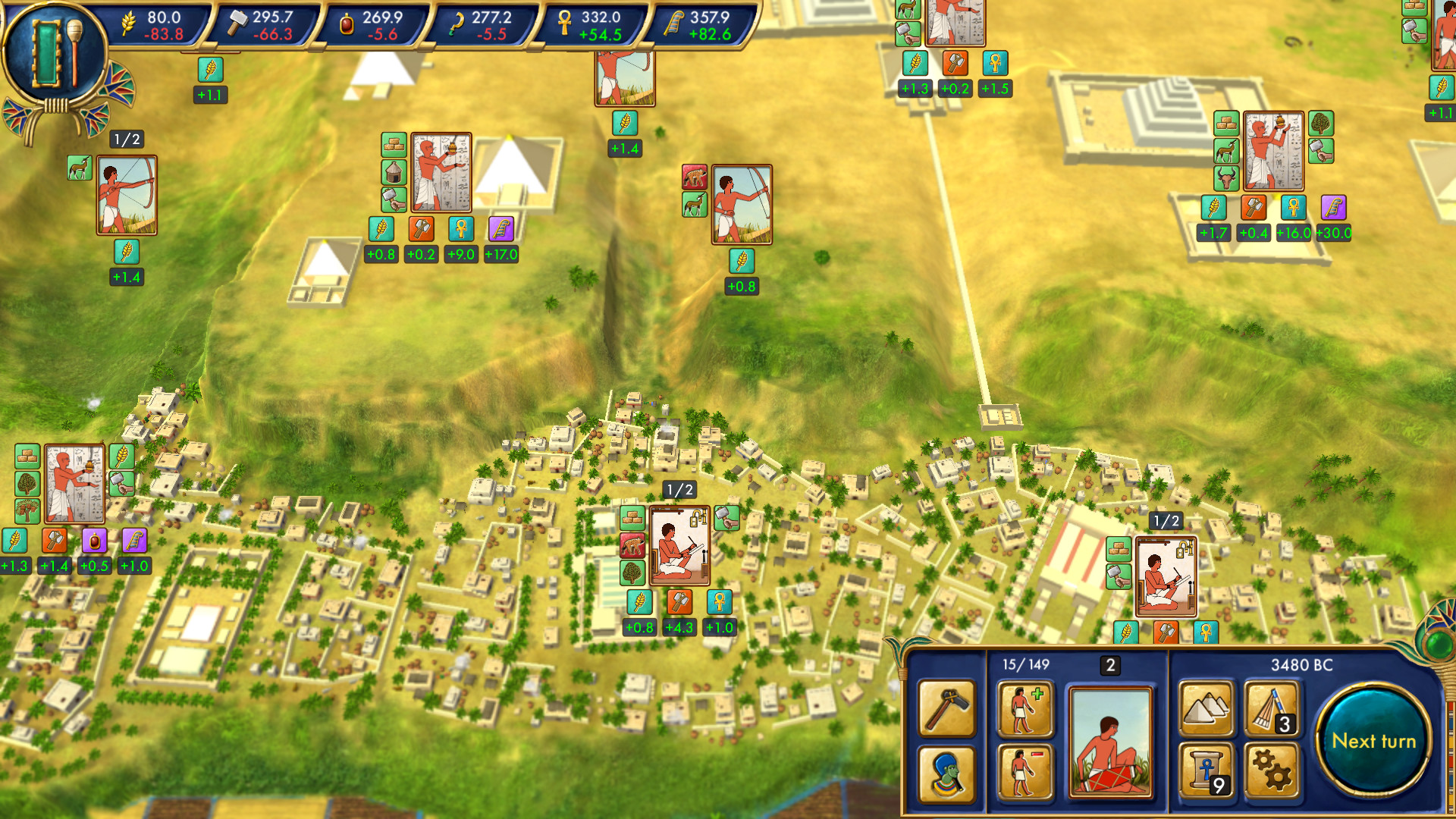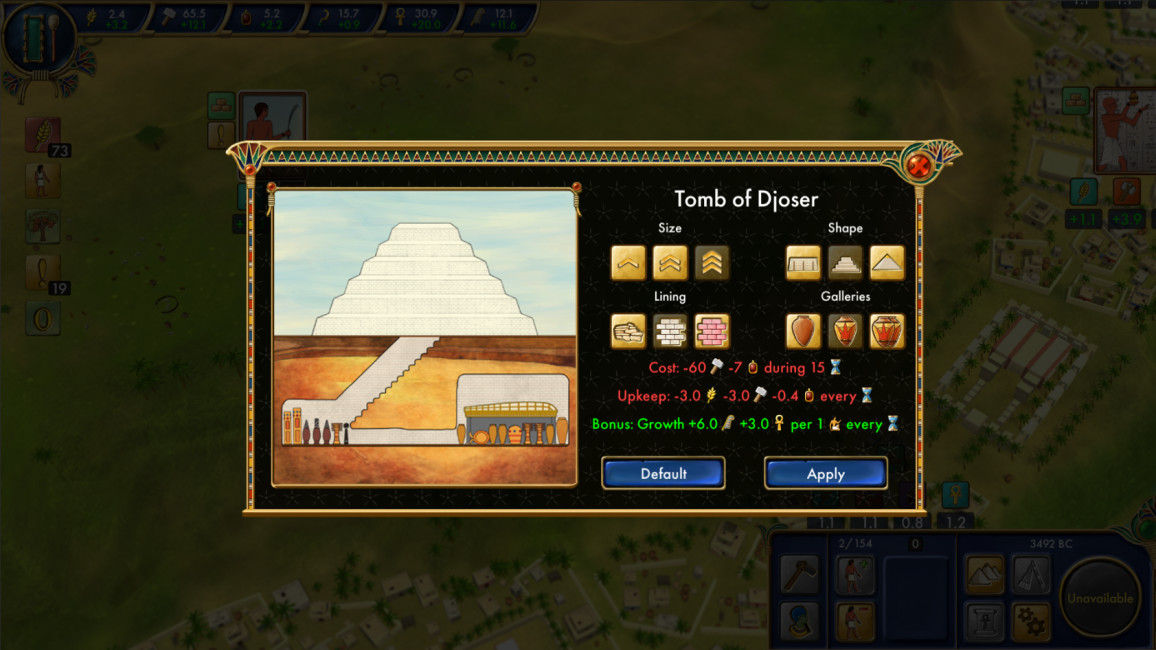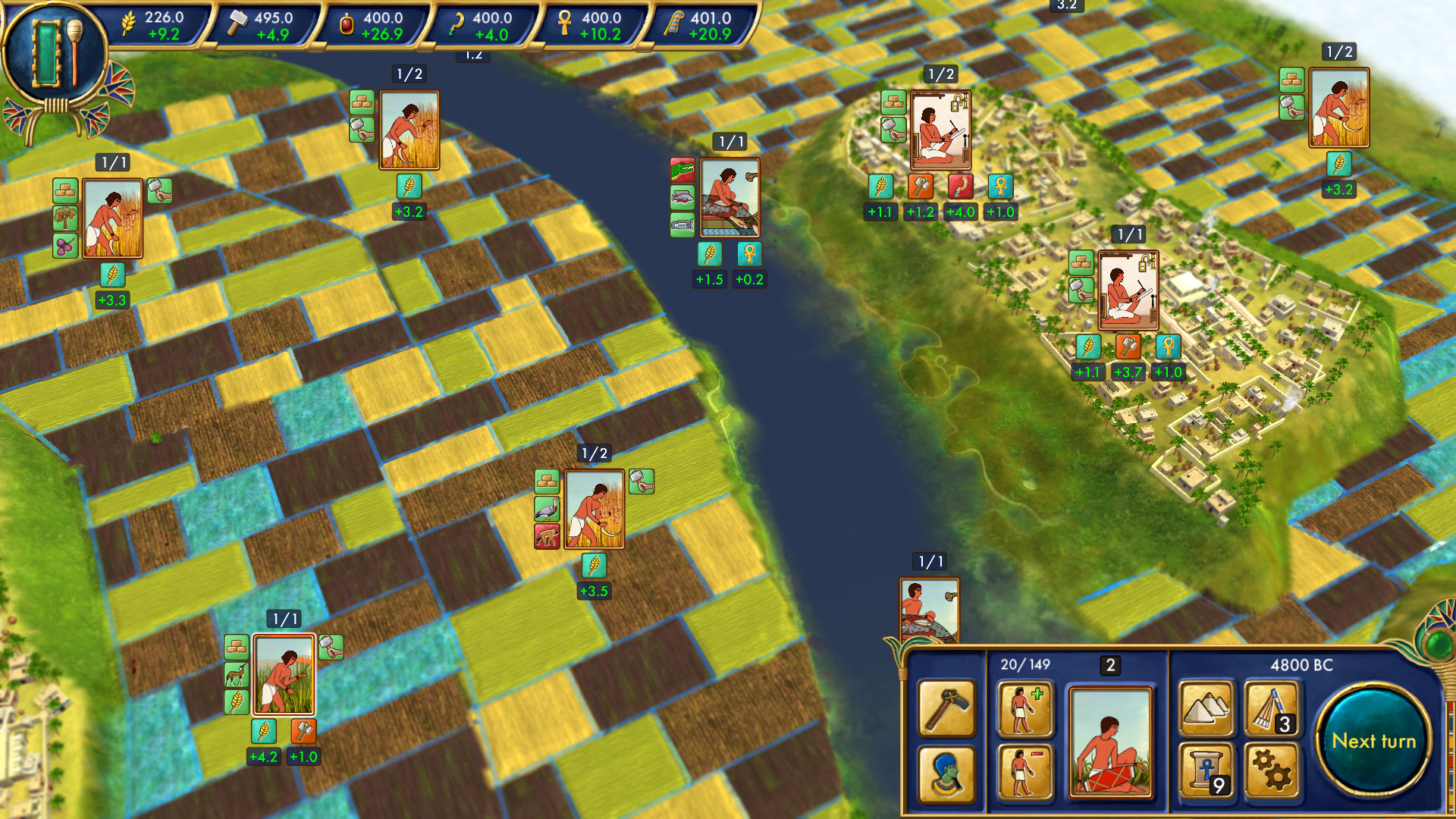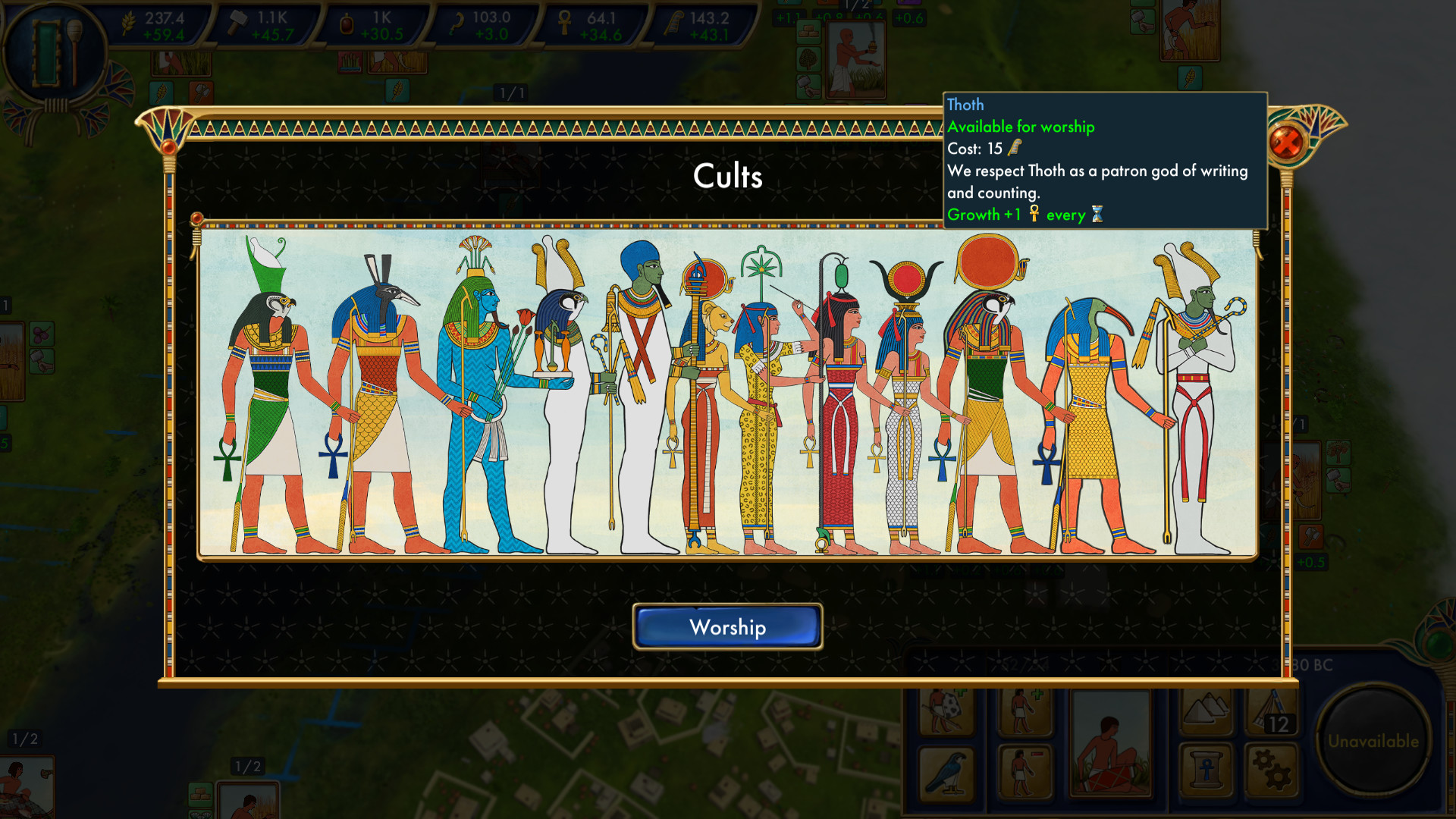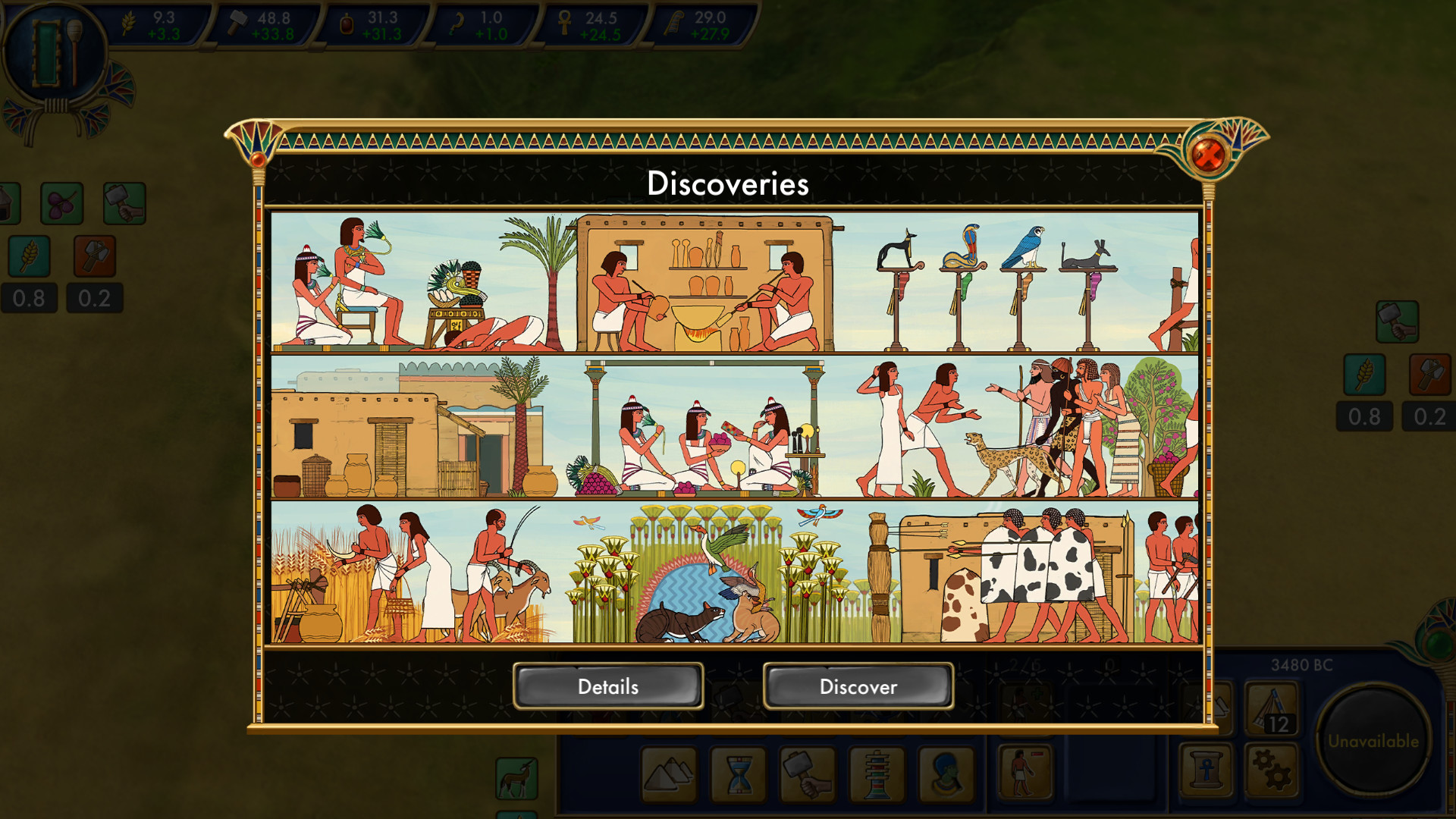You are one of multitude incarnations of the great Horus, and side by side with the pharaohs, you are fighting against the mighty Seth, who unleashes numerous disasters upon the lands of Ancient Egypt. Win wars and overcome crises, discover new technologies, worship your gods and conquer neighboring tribes! Are you wise enough to help the ancient kings to unify Lower and Upper Egypt, build a stable economy and to create the Great Pyramids?
Based on real history
You will find yourself in Memphis, 3500-2140 years B.C., the time of the first six dynasties of pharaohs. You will unify the country and create a prosperous kingdom, which later will have to face the havoc of the First Intermediate Period.Construction of the pyramids
You will lead the construction of pyramids, choose their design and materials. This process requires tremendous investments, but it is the only way to keep peace and order in the country.Ancient society simulator
You will not only deal with the problems of farmers and craftsmen but also make important political decisions, which will define the future of the kingdom. Numerous challenges and events of different scale await you.Ancient maps
Discover the world of the Old Kingdom: exploit new lands, send expeditions to different places, and meet different cultures. Use every opportunity to learn about your surroundings and to expand Egypt's borders.Difference from Predynastic Egypt
- More diversity in the game, varied tasks in the regions, different tactics for playthroughs and unique bonuses from patron gods.
- The game is longer now, after the main campaign there is a free-play survival mode.
- New technologies: 3D engine and skeletal animation.
Developers Diary, Issue #8

Do you recall when you first found out about pyramids? I think every children encyclopedia has an article about it. That's how I found out about them, among the others 7 world wonders. It's a pity that now we only have one world wonder preserved, but at the same time, it's unbelievable! They are around 4500 years old!
Pyramides is a very important element for Egyptians and for Egyptian history. The format of our game would not let us do this topic a justice, so at first, we didn't plan to delve into it. But when in the Predynastic Kingdom it was possible to just briefly mention the pyramids, without much information, it's a whole another story for the Old Kingdom period. At this time, pyramids were tightly woven in the net of governmental systems; almost every side of Egyptian life was somehow connected to them.
Burial ritual was simple at first. During the predynastic period, it was just a wooden sarcophagus. It was placed in a burial chamber in the earth, chamber's walls were worked up with brick. After a while, people started to make an earthen hill on top of the chamber. Earthen hill gradually became a mastaba - flat-roofed rectangular structure, like a truncated pyramid. Eventually, famous Egyptian architect Imhotep, who was a counselor to the pharaoh Djoser, invented something new. Originally he was just going to build a standard mastaba for the king but ended up building six more mastabas on top of the biggest one. The result was the first pyramid, which became a prototype for all of the following pyramids.
Real Djoser Pyramid, our concept-art, the pyramid in the construction menu, the pyramid on the city map
The higher and complex pyramids got, the more sources they demanded construction, maintenance, and sacrifices. Lion's share of all sources was used for construction. Workshops created an endless amount of art objects only to bury them underground. Egypt sent expeditions to nearby countries when it needed more sources. Pharaohs built at least one pyramid for himself, and some of them built several. For example, Pharaoh Sneferu built at least 12 of them! However, not all of them preserved until now. After Sneferu's pyramids, the most famous Hufu pyramid was built. Then the decentralization slowly began, not allowing pharaohs to collect enough power and sources to build something like majestic Hufu's pyramids, but they still built smaller ones.
In short, the history of pyramids reflects the history of rising and fall of the first Egyptian Kingdom. And since our game is all about this history, the menu of pyramids construction almost made itself.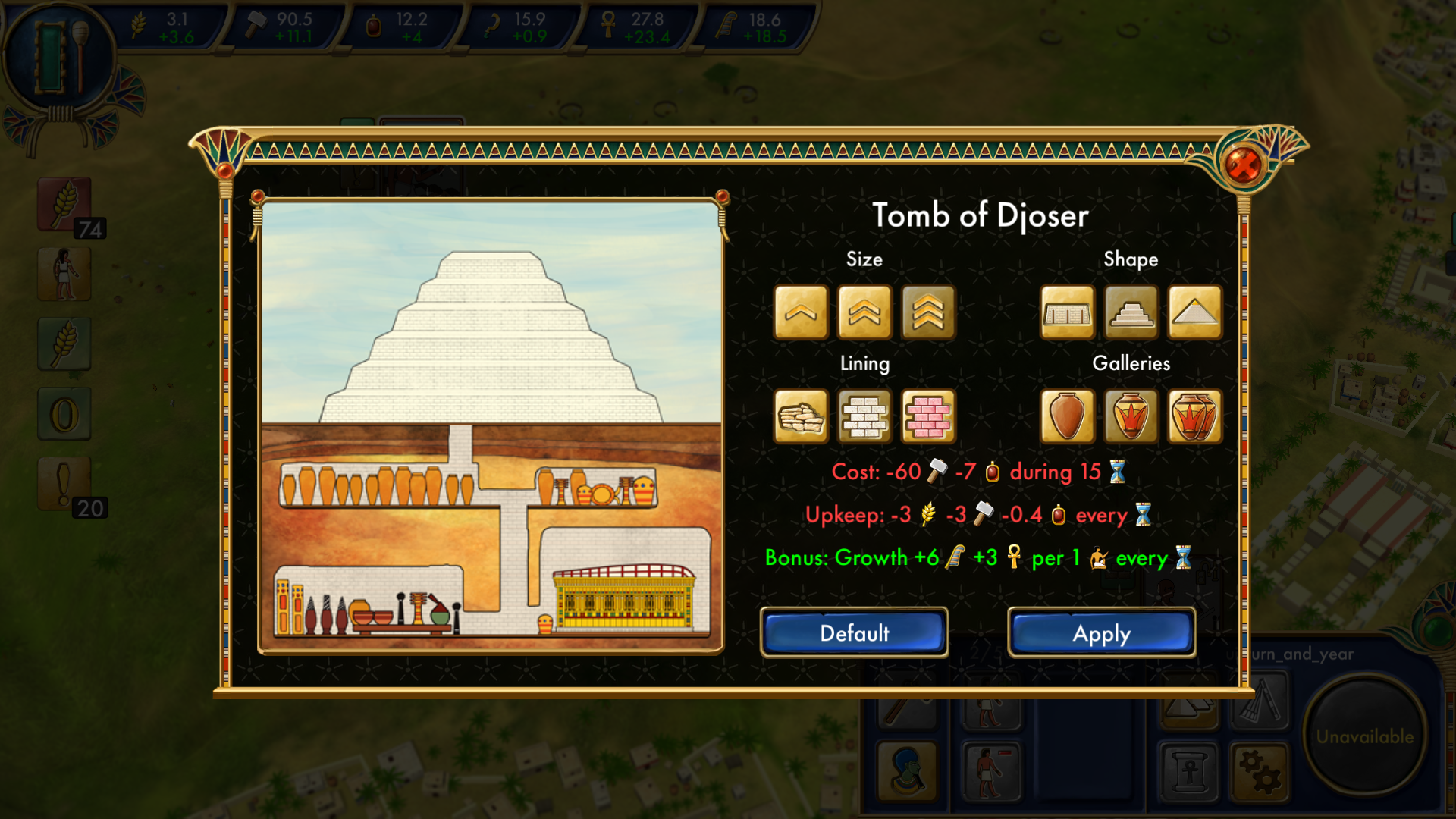
Our menu covers the most basic knowledge necessary for better understanding of Old Kingdom's history. It has four main features: height, shape, finishing and the type and size of a burial chamber. The player will be able to select any combination; the price of construction will change accordingly. At the beginning though not every option will be available. To open them all, the player will have to learn all necessary technologies first.
In some cases, the option of selecting the architect will be available. They will influence the construction basing on their unique professional qualities.
Sometimes during the construction, good or bad events may happen, such as a technological breakthrough, which will boost the bonuses for construction. On the other hand, something bad may happen, such as walls destruction, which will entail higher construction fees.
Construction or pyramids are not an obligatory rule for winning the game. You can try and completely avoid this process, but in this case, it will be really difficult to win the game. As you remember, we mentioned before that pyramids were built to please the gods and ancestors. Without pyramids, many unhappy events will start to happen. But you still can try :)
For Egyptians, pyramids were something like a guarantee of stability and they feared to lose ancestors' protection. Often pyramids were left unfinished - when there were not enough sources or when the pharaoh who started to build them died. Egyptians considered it as a bad omen; it meant the dead pharaoh lost the protection of gods.
Construction of pyramids lasts until the end of the game and generally follows historical events. But the player may also learn all technologies and build all of the pyramids ahead of historical time. In case if technologies will not be learned in time, the player will only be able to build the simplest forms of pyramids.
Despite our original unwillingness to delve into the pyramids construction, we came up with this unexpectedly interesting construction menu. We hope it will help a player to understand how Egyptian society worked. We like this new element of the game and can't wait to hear your thoughts about it.
Pyramids construction

Do you recall when you first found out about pyramids? I think every children encyclopedia has an article about it. That's how I found out about them, among the others 7 world wonders. It's a pity that now we only have one world wonder preserved, but at the same time, it's unbelievable! They are around 4500 years old!
Pyramides is a very important element for Egyptians and for Egyptian history. The format of our game would not let us do this topic a justice, so at first, we didn't plan to delve into it. But when in the Predynastic Kingdom it was possible to just briefly mention the pyramids, without much information, it's a whole another story for the Old Kingdom period. At this time, pyramids were tightly woven in the net of governmental systems; almost every side of Egyptian life was somehow connected to them.
Burial ritual was simple at first. During the predynastic period, it was just a wooden sarcophagus. It was placed in a burial chamber in the earth, chamber's walls were worked up with brick. After a while, people started to make an earthen hill on top of the chamber. Earthen hill gradually became a mastaba - flat-roofed rectangular structure, like a truncated pyramid. Eventually, famous Egyptian architect Imhotep, who was a counselor to the pharaoh Djoser, invented something new. Originally he was just going to build a standard mastaba for the king but ended up building six more mastabas on top of the biggest one. The result was the first pyramid, which became a prototype for all of the following pyramids.

Real Djoser Pyramid, our concept-art, the pyramid in the construction menu, the pyramid on the city map
The higher and complex pyramids got, the more sources they demanded construction, maintenance, and sacrifices. Lion's share of all sources was used for construction. Workshops created an endless amount of art objects only to bury them underground. Egypt sent expeditions to nearby countries when it needed more sources. Pharaohs built at least one pyramid for himself, and some of them built several. For example, Pharaoh Sneferu built at least 12 of them! However, not all of them preserved until now. After Sneferu's pyramids, the most famous Hufu pyramid was built. Then the decentralization slowly began, not allowing pharaohs to collect enough power and sources to build something like majestic Hufu's pyramids, but they still built smaller ones.
In short, the history of pyramids reflects the history of rising and fall of the first Egyptian Kingdom. And since our game is all about this history, the menu of pyramids construction almost made itself.

Our menu covers the most basic knowledge necessary for better understanding of Old Kingdom's history. It has four main features: height, shape, finishing and the type and size of a burial chamber. The player will be able to select any combination; the price of construction will change accordingly. At the beginning though not every option will be available. To open them all, the player will have to learn all necessary technologies first.
In some cases, the option of selecting the architect will be available. They will influence the construction basing on their unique professional qualities.
Sometimes during the construction, good or bad events may happen, such as a technological breakthrough, which will boost the bonuses for construction. On the other hand, something bad may happen, such as walls destruction, which will entail higher construction fees.
Construction or pyramids are not an obligatory rule for winning the game. You can try and completely avoid this process, but in this case, it will be really difficult to win the game. As you remember, we mentioned before that pyramids were built to please the gods and ancestors. Without pyramids, many unhappy events will start to happen. But you still can try :)
For Egyptians, pyramids were something like a guarantee of stability and they feared to lose ancestors' protection. Often pyramids were left unfinished - when there were not enough sources or when the pharaoh who started to build them died. Egyptians considered it as a bad omen; it meant the dead pharaoh lost the protection of gods.

Construction of pyramids lasts until the end of the game and generally follows historical events. But the player may also learn all technologies and build all of the pyramids ahead of historical time. In case if technologies will not be learned in time, the player will only be able to build the simplest forms of pyramids.
Despite our original unwillingness to delve into the pyramids construction, we came up with this unexpectedly interesting construction menu. We hope it will help a player to understand how Egyptian society worked. We like this new element of the game and can't wait to hear your thoughts about it.
[ 2017-12-11 13:24:59 CET ] [Original Post]
Minimum Setup
- Processor: Intel Core 2 Duo 1.8 Ghz or AMD Athlon X2 64 2.0 GhzMemory: 4 GB RAM
- Memory: 4 GB RAM
- Graphics: 1024768. 1 GB VRAM
- Storage: 2 GB available space
Recommended Setup
- Processor: Intel i5 or AMD analoguesMemory: 8 GB RAM
- Graphics: 19201080. 2 GB VRAM
- Storage: 2 GB available space
GAMEBILLET
[ 6355 ]
FANATICAL
[ 6587 ]
GAMERSGATE
[ 3177 ]
MacGameStore
[ 2532 ]
INDIEGALA
[ 1655 ]
LOADED
[ 1040 ]
ENEBA
[ 32822 ]
Green Man Gaming Deals
[ 867 ]
AllKeyShop
[ 45629 ]
YUPLAY
[ 6040 ]
Gamivo
[ 17235 ]
HUMBLE
[ 819 ]
FANATICAL BUNDLES
GMG BUNDLES
HUMBLE BUNDLES
INDIEGALA BUNDLES
by buying games/dlcs from affiliate links you are supporting tuxDB

